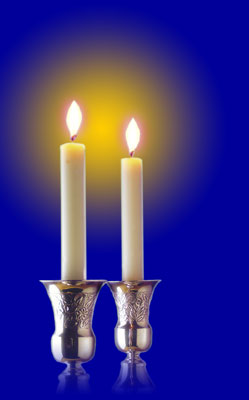In the July 30 sermon, I am inviting our church family to seriously practice Sabbath keeping, for at least four weeks. Then, on Wed. Aug. 23 at 6:30, folks are invited to meet for dinner at Bakers and share experiences.
To support this process, I am posting some Sabbath practice suggestions. This post will be the first of at least four, possibly more.
Since Sabbath practices are rooted deeply in our tradition, all the way back to the decalogue (ten commandments), it is appropriate to pay attention to Jewish practices. After all, they are much more historically practiced and the Sabbath is more central to Jewish practice (although it should be just as central for Christians).

The image you see above are Sabbath candles. There are two, representing the two passages of Scripture that command the Sabbath. Both are accounts of the Decalogue, one in Exodus 20, and one in Deuteronomy 5. The Exodus 20 passages begins with the word "remember" and the Deut. 5 passage with "observe." Thus the two candles are for "remember" and "observe."
(A word on rules and legalism: the point of all of is this to receive God's grace. So read these and find something that looks like a blessing. Do not be oppressed by the suggestions, just take what looks useful, and go with that.)
In Jewish tradition, Sabbath begins at sundown. You could begin your Sabbath then, at dinner time, bedtime, or when you awake in the morning. The two candles are lit, and this prayer, the Kiddush, is recited.
Blessed are Thou, O Lord our God, King of the Universe, who hast hallowed us by His Commandments and commanded us to kindle the Sabbath light!
After this prayer, you may...
- give thanks for all of the creation this past week and for the Joy of God's creating now an opportunity to cease from labor.
- pray about ways to spend the day and ask that these activities draw you closer to God and fill you more fully with a sense of God's presence in your life.
- pray for the Church, pastors, musicians, and others who contribute to worship around the world on Sundays. (Gives global perspective)p.12
You could then continue with an order of worship including
- Blessing of the children (laying hands on your children's heads and praying for them)
- Singing
- Blessing of the meal
- Eating and enjoying meal together
- Prayer at end of meal based on Deut 8:10
- Evening talking with family and friends, and studying Bible
A "God Hunt" to develop children's capacity to recognize God's work in every day lives.
1. Any obvious answer to prayer
2. Any unexpected evidence of God's care
3. Any unusual linkage or timing
4. Any help to do God's work in the world
Then a "God Hunt" for the adults at adult level conversation after children "hunt"
Another set of suggestions for family worship to welcome the Sabbath:
1. Keep it short and simple
2. Find a way for as many as possible to take part
3. Do not rely only on words; find simple symbolic gestures to represent the important parts of family life
4. Come to recognize the power of repetition
5. Invite others to join you
6. Have fun
Other Sabbath practice ideas:
-Put away anything that is related to work, so that it is out of sight.
-Take a Sabbath walk. If you live with other family members, you might all walk in silence and focus on God and God's creation, and then share reflections afterward.
-Don't run any errands, or shop, or do anything that qualifies as work, around the house or otherwise. To cease is to let God be God and simply stop, and enjoy God's presence, and all of the blessings of life.
- Remember the Sabbath is about letting go of control, of trying to secure our own future, and to trust in God's presence. There is no need to accomplish anything on this day. Let the dishes pile up- they will wait until tomorrow.
God certainly did not choose Israel because of their accomplishments or their productivity. They were the least among the people of the ancient Near East. They were rebellious and self-centered. They constantly failed to keep their end of the covenant relationship with Yahweh. So God's love for them is related not to what they do, but to his character as the eternal "I AM."
This is what we celebrate on the Sabbath day. We join with the generations of believers- going al the way back to God'’s people, the Jews- who set aside a day to remember that we are precious and honored in God's sight and loved, profoundly loved, not because of what we produce.
To celebrate God's love on our Sabbath also transforms us that we can more deeply value others in the same way. (20)
Hi, I don't want to "intrude" on your blog (I ended up here from Megan's blog, and I'm also interested in Sabbath-related stuff) but I just wanted to note that the blessing you mentioned is not the Kiddush. The Kiddush is a food-related blessing that precedes the blessing over wine, food, etc.
ReplyDeleteWelcome B- you're not intruding! My resource was either wrong, or I misread it.. I'll have to check. Does that prayer have a name?
ReplyDeleteAmy
Not that I know of; it's just the blessing over candles. There are a lot of blessings like that for different things, so they don't have specific names really. The Kiddush is more like a fancier, "pre-blessing."
ReplyDelete